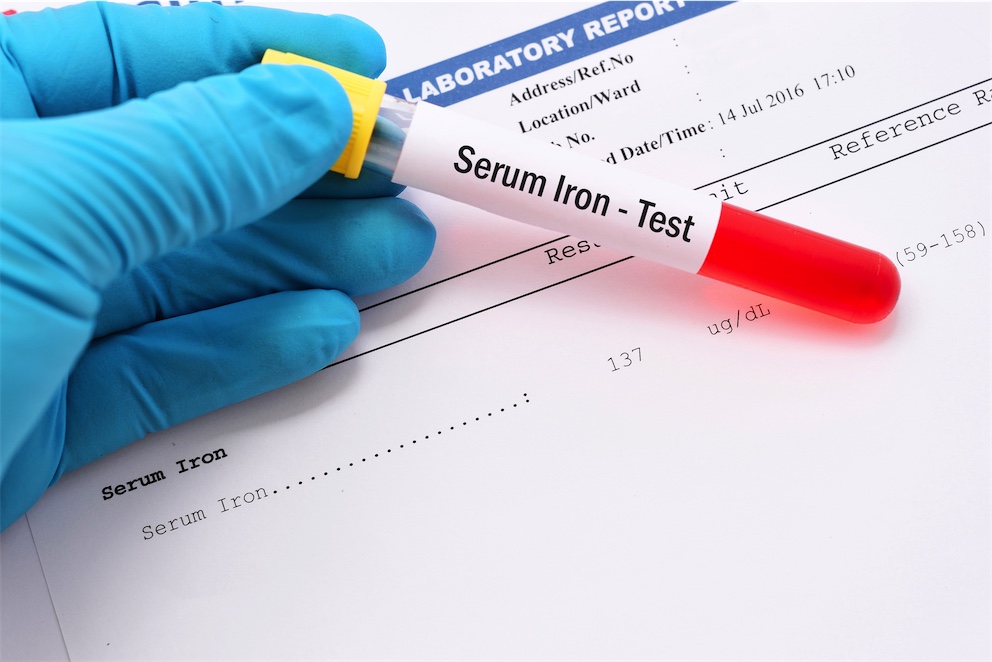A common nutrient deficiency
Iron deficiency is the most common nutrient deficiency in the world. A 2010 study estimated that 1 in every 3 people (32.9%) have low iron1.
Why iron is important
Iron is an essential component of haemoglobin found in your red blood cells. Haemoglobin is responsible for transporting oxygen to your cells and removing carbon dioxide. If you lack iron, your red blood cells become smaller and paler and can’t deliver as much oxygen to your cells. Your cells need oxygen to make cellular energy.
Iron is also involved in the production of neurotransmitters and hormones such as serotonin, noradrenaline and thyroid hormones, liver detoxification, immunity, skin health (synthesis of collagen and elastin), production of stomach acid, and Vitamin A2.
Inability to produce cellular energy, thyroid hormones, digest food properly and have optimal detoxification all contribute to feelings of fatigue.
Signs of iron deficiency
Signs and symptoms vary with the degree of deficiency. The most common include
- Fatigue with reduced work productivity
- Paleness of inside mouth, lower eyelid and nail beds
- Shortness of breath on exertion or reduced exercise tolerance
- Headaches
Followed by
- Hair loss – general all-over thinning
- Glossy, smooth tongue
- Dry and rough skin
- Dry and brittle hair
- Fast heartbeat
- Poor concentration
- Difficulty maintaining body temperature in cold weather
- Sleep problems
- Reduced immunity
- Fainting
- Restless leg syndrome3
Sources of iron
Because iron is essential to your body, it is tightly regulated. Most of the iron in your body is recycled from your worn-out red blood cells. However, you must also top up these stores with iron derived from your diet.
How do you become deficient in iron?
- Blood loss through haemorrhaging, heavy menstrual bleeding, fibroids, gastrointestinal bleeding (ulcers, inflammatory bowel disease such as Crohn’s or ulcerative colitis, cancer, haemorrhoids, parasites, Helicobacter pylori infection), severe nosebleeds and medications such as non-steroidal anti-inflammatory drugs (NSAIDs).
- Increased growth demands during childhood, adolescence and pregnancy
- Reduced intake with vegetarian or vegan diets
- Decreased absorption – elderly, digestive conditions such as coeliac disease or hypochlorhydria, gastric bypass surgery, medications such as proton pump inhibitors and metformin, or high consumption of dietary inhibitors of iron such as phytates and tannins.
- Increased destruction of red blood cells as occurs in malaria or very high-intensity exercise.
- You can also have a functional deficiency where the body has sufficient iron, but it is locked away due to conditions that cause chronic infection or inflammation.
- In rare cases, there are genetic mutations that affect the hormone hepcidin which regulates iron
Testing for iron deficiency
If you suspect you might have an iron deficiency, you should make an appointment with your medical professional to arrange a test before commencing iron supplementation. This is important because iron is a “Goldilocks” mineral – not too much and not too little. Excess iron is damaging to your body. There is a very good reason oral iron supplements are required to have child safety lids!
Necessary testing to determine your iron status includes
- Iron studies (determines your stores and ability to transport iron)
- Full blood count (provides information on any changes to your blood cells)
Iron deficiency is both a cause and a symptom that may point to other imbalances in your body, so it’s important to track these down so the underlying cause can be corrected.
To learn more about optimising your intake of iron in your diet, check out this article.
References
- Lopez A, Cacoub P, Macdougall IC, Peyrin-biroulet L. Iron deficiency anaemia. Lancet. 2015;6736(15) 1-10. doi10.1016/S0140-6736(15)60865-0.
- Camaschella C. Iron deficiency anemia. N Engl J Med. 2015;372(19)1832-1843. doi 10.1056/NEJMra1401038.
- Braun L, Cohen M. Herbs & Natural Supplements: An Evidence Based Guide. 3rd ed. Chatswood, NSW Elsevier; 2010.

Need help with your health?
Norelle Hentschel is an experienced naturopath with a clinic in Stones Corner, Brisbane, who enjoys supporting her clients to reach their health goals. She also offers consults via Telehealth Australia-wide.
Want more articles like this?
Receive a monthly digest of natural health information to help you become “health” sufficient!
PS. Your inbox real estate is precious, and we will never annoy you with sales pitches or share your details with anyone else. One email a month — that’s it.

